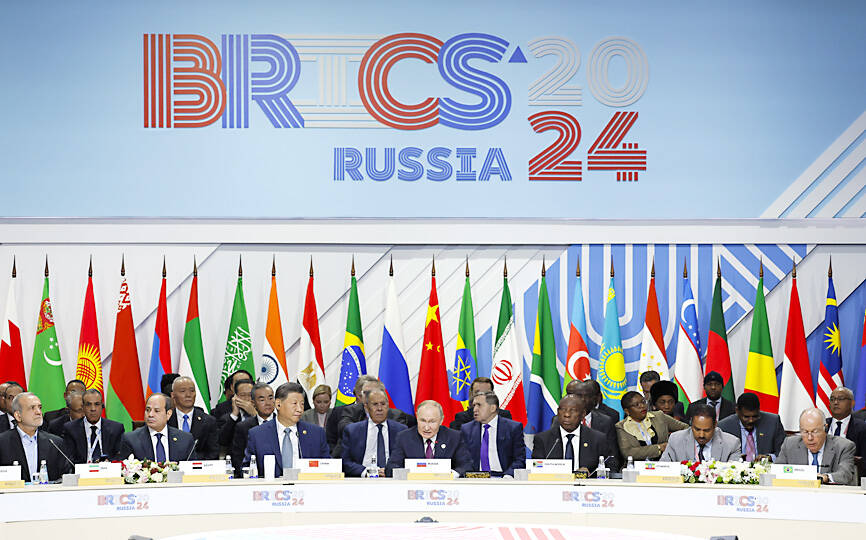US president-elect Donald Trump on Saturday threatened 100 percent tariffs against a bloc of nine nations if they act to undermine the US dollar.
His threat was directed at countries in the so-called BRICS alliance, which consists of Brazil, Russia, India, China, South Africa, Egypt, Ethiopia, Iran and the United Arab Emirates.
Turkey, Azerbaijan and Malaysia have applied to become members and several other countries have expressed interest in joining.

Photo: Maxim Shemetov via AP
While the US dollar is by far the most-used currency in global business and has survived past challenges to its preeminence, members of the alliance and other developing nations say they are fed up with America’s dominance of the global financial system.
The US dollar represents roughly 58 percent of the world’s foreign exchange reserves, according to the IMF and major commodities like oil are still primarily bought and sold using US dollars.
However, the US dollar’s dominance is threatened by BRICS’ growing share of GDP and the alliance’s intent to trade in non-US dollar currencies — a process known as de-dollarization.
Trump, in a Truth Social post, said: “We require a commitment from these Countries that they will neither create a new BRICS Currency, nor back any other Currency to replace the mighty US Dollar or, they will face 100 percent Tariffs, and should expect to say goodbye to selling into the wonderful US Economy.”
At a summit of BRICS nations in October, Russian President Vladimir Putin accused the US of “weaponizing” the US dollar and described it as a “big mistake.”
“It’s not us who refuse to use the dollar,” Putin said at the time. “But if they don’t let us work, what can we do? We are forced to search for alternatives.”
Russia has specifically pushed for the creation of a new payment system that would offer an alternative to the global bank messaging network, SWIFT, and allow Moscow to dodge Western sanctions and trade with partners.
Research shows that the US dollar’s role as the primary global reserve currency is not threatened in the near future.
An Atlantic Council model that assesses the US dollar’s place as the primary global reserve currency states the greenback is “secure in the near and medium term” and continues to dominate other currencies.
Trump’s latest tariff threat comes after he threatened to slap 25 percent tariffs on everything imported from Mexico and Canada, and an additional 10 percent tax on goods from China, as a way to force the countries to do more to halt the flow of illegal immigration and drugs into the US.
He has since held a call with Mexican President Claudia Sheinbaum, who said on Thursday she is confident that a tariff war with the US could be averted.
Canadian Prime Minister Justin Trudeau returned home on Saturday after meeting Trump without assurances the president-elect would back away from threatened tariffs on Canada.

The US dollar was trading at NT$29.7 at 10am today on the Taipei Foreign Exchange, as the New Taiwan dollar gained NT$1.364 from the previous close last week. The NT dollar continued to rise today, after surging 3.07 percent on Friday. After opening at NT$30.91, the NT dollar gained more than NT$1 in just 15 minutes, briefly passing the NT$30 mark. Before the US Department of the Treasury's semi-annual currency report came out, expectations that the NT dollar would keep rising were already building. The NT dollar on Friday closed at NT$31.064, up by NT$0.953 — a 3.07 percent single-day gain. Today,

‘SHORT TERM’: The local currency would likely remain strong in the near term, driven by anticipated US trade pressure, capital inflows and expectations of a US Fed rate cut The US dollar is expected to fall below NT$30 in the near term, as traders anticipate increased pressure from Washington for Taiwan to allow the New Taiwan dollar to appreciate, Cathay United Bank (國泰世華銀行) chief economist Lin Chi-chao (林啟超) said. Following a sharp drop in the greenback against the NT dollar on Friday, Lin told the Central News Agency that the local currency is likely to remain strong in the short term, driven in part by market psychology surrounding anticipated US policy pressure. On Friday, the US dollar fell NT$0.953, or 3.07 percent, closing at NT$31.064 — its lowest level since Jan.

The New Taiwan dollar and Taiwanese stocks surged on signs that trade tensions between the world’s top two economies might start easing and as US tech earnings boosted the outlook of the nation’s semiconductor exports. The NT dollar strengthened as much as 3.8 percent versus the US dollar to 30.815, the biggest intraday gain since January 2011, closing at NT$31.064. The benchmark TAIEX jumped 2.73 percent to outperform the region’s equity gauges. Outlook for global trade improved after China said it is assessing possible trade talks with the US, providing a boost for the nation’s currency and shares. As the NT dollar

The Financial Supervisory Commission (FSC) yesterday met with some of the nation’s largest insurance companies as a skyrocketing New Taiwan dollar piles pressure on their hundreds of billions of dollars in US bond investments. The commission has asked some life insurance firms, among the biggest Asian holders of US debt, to discuss how the rapidly strengthening NT dollar has impacted their operations, people familiar with the matter said. The meeting took place as the NT dollar jumped as much as 5 percent yesterday, its biggest intraday gain in more than three decades. The local currency surged as exporters rushed to